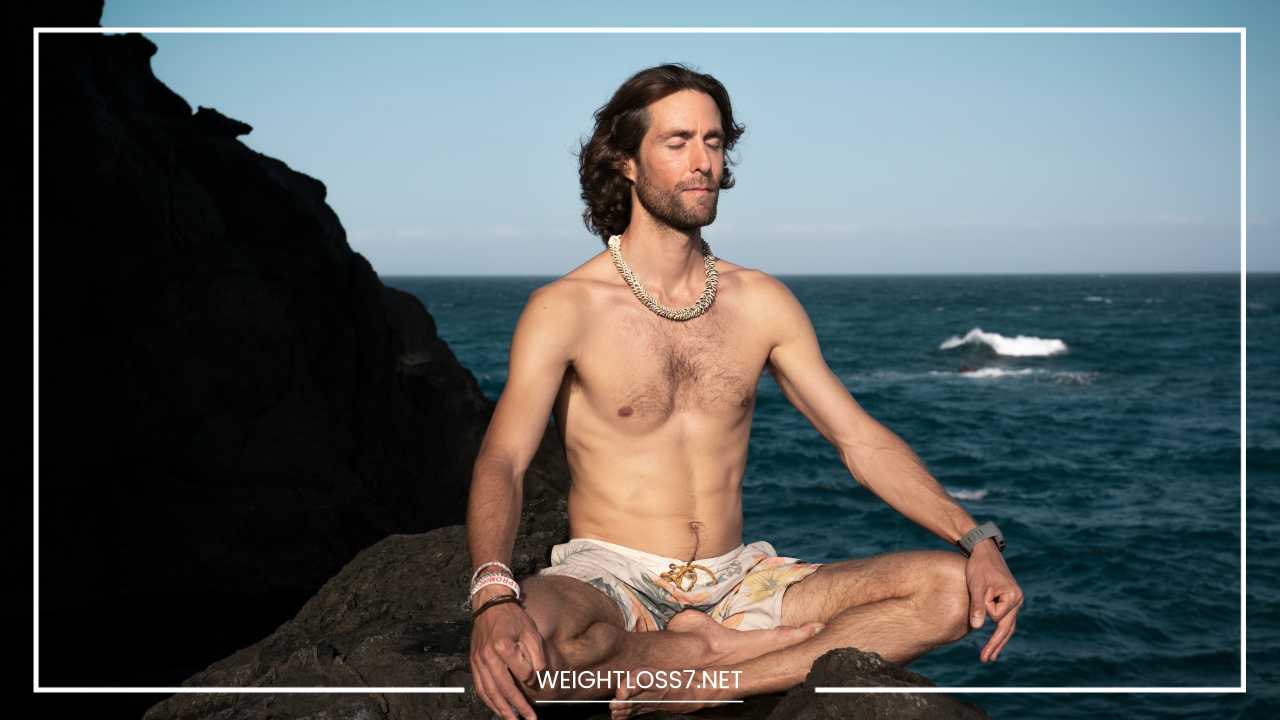Why Real Men Do Yoga

Men’s Yoga
Why Real Men Do Yoga: Strength, Focus, and Finding Your Inner Warrior
Shattering the Stereotype: A History of Yoga Rooted in Masculinity
The image of a “real man” has been sculpted by society for decades. It’s a picture of stoicism, unwavering strength, and an inability to show vulnerability. But this outdated stereotype is crumbling.
Modern men are embracing a more holistic definition of masculinity, one that values not just physical prowess but also mental well-being, emotional intelligence, and yes, even yoga.
Yoga’s Warrior Roots: Strength and Discipline from Antiquity
Yoga’s origins are far removed from the Lululemon-clad studios of today. Its roots trace back thousands of years to ancient India, where it was practiced by philosophers, warriors, and spiritual seekers alike.
The word “yoga” itself comes from the Sanskrit word “yuj,” which means “to yoke” or “to unite.” This philosophy goes beyond the physical, aiming to connect the mind, body, and spirit.
Early yogis, many of whom were warriors, understood the importance of flexibility and balance alongside physical strength.
Yoga poses, known as asanas, were designed to build resilience, improve agility, and enhance focus on the battlefield. In fact, some of the most challenging yoga poses, like arm balances and inversions, require immense strength and core stability.
Beyond the Asana: A Multifaceted Approach to Wellbeing for Men
While the physical benefits of yoga are undeniable, they represent just one piece of the puzzle. Here’s a deeper dive into how yoga empowers men in various aspects of life:
-
Building Functional Strength: Forget the gym stereotype of bulky muscles. Yoga builds functional strength, meaning your body becomes stronger in the movements you use every day. Holding poses like warrior II and chair pose strengthens your core and legs, improving posture and everyday activities like carrying groceries or playing with your kids.
-
Injury Prevention and Recovery: Tight muscles are a recipe for disaster. Yoga improves flexibility and range of motion, while strengthening supporting muscles around joints. This translates to a lower risk of injuries and a faster recovery process for athletes and weekend warriors alike. Studies have shown that yoga can be particularly beneficial in preventing and rehabilitating common sports injuries like lower back pain and rotator cuff issues.
-
Unleashing Your Athletic Potential: Whether you’re a weekend runner, a seasoned weightlifter, or a martial artist, yoga can elevate your performance. Increased flexibility allows for greater range of motion, leading to more powerful movements and better technique in your chosen sport. For example, golfers can improve their swing mechanics through improved spinal mobility, while martial artists can benefit from increased flexibility and balance for kicks and throws.
-
Stress Management in a Modern World: The constant pressure to perform at work, maintain a social life, and care for loved ones can leave you feeling burnt out. Yoga incorporates breathwork (pranayama) and meditation, powerful tools for managing stress and anxiety. By focusing on your breath and calming your mind, you can find inner peace and approach challenges with a clearer perspective. Research suggests that regular yoga practice can lower cortisol levels, the stress hormone, and improve sleep quality, both of which contribute to better stress management.
-
Sharpening Your Mental Edge: Yoga isn’t just about physical postures. It cultivates mindfulness, the ability to focus your attention on the present moment. This translates to improved concentration at work, better decision-making skills, and a heightened awareness of your thoughts and emotions. Think of it as mental training for everyday life. Studies have shown that yoga can improve cognitive function, memory, and reaction time, all of which can benefit your professional and personal life.
The Warrior Within: Cultivating Discipline and Self-Discovery
Yoga isn’t about achieving perfect poses or fitting into a mold. It’s a journey of self-discovery, pushing your limits, and finding strength you never knew you had. Here’s how yoga resonates with the warrior spirit within men:
-
Discipline and Perseverance: Mastering a yoga pose requires dedication and consistent practice. It’s about showing up, even on tough days, and pushing yourself a little further each time. This builds resilience, a key trait of any warrior, both on and off the mat. Yoga teaches you to approach challenges with a growth mindset, understanding that progress takes time and effort.
-
Mental Fortitude: Yoga challenges you not just physically, but also mentally. Holding a pose that tests your balance or flexibility requires grit and the ability to quiet your inner critic. This mental toughness cultivates a “never give up” attitude that can be applied to any obstacle life throws your way. Yoga teaches you to control your breath and focus your mind, even in challenging situations.
-
Self-Awareness: Yoga encourages you to tune into your body and mind. You learn your limitations and strengths, allowing you to approach challenges with a clear-headed understanding of yourself. This self-awareness translates to better decision-making and the ability to navigate life’s complexities with confidence. By observing your reactions in yoga poses, you can learn to identify and manage your emotions more effectively in everyday situations.
Building a Community: Finding Your Tribe on the Mat
The yoga community is a welcoming and supportive space for men of all ages and backgrounds. Stepping onto the mat can be intimidating at first, but you’ll quickly find that most yoga studios foster a sense of camaraderie and encouragement. Here’s why connecting with others through yoga can be beneficial:
-
Breaking Down Barriers: Stepping outside your comfort zone and trying something new can be daunting. But in a yoga class, everyone is there to learn and improve. This shared experience can help break down social barriers and create a sense of belonging.
-
Finding Mentorship: Many yoga studios have experienced instructors who can offer guidance and support on your yoga journey. These teachers can help you refine your poses, answer your questions, and provide valuable insights into the practice.
-
Building Accountability: Having a supportive network of fellow yogis can keep you motivated. Knowing that others are counting on you to show up can make a big difference in sticking with your practice. You can find workout buddies, share experiences, and celebrate each other’s progress.
Taking the First Step: Gearing Up and Getting Started
Ready to step onto the mat and experience the benefits of yoga firsthand? Here’s a quick guide to get you started:
-
Finding the Right Class: There are many different styles of yoga, so explore your options and find one that resonates with you. If you’re new to yoga, consider a beginner-friendly class like Hatha or Vinyasa flow (slow flow).
-
What to Wear: Comfort is key! Choose loose-fitting clothing that allows for freedom of movement. A simple t-shirt and yoga pants or shorts are perfectly fine.
-
Yoga Gear (Optional): While not essential, a yoga mat will provide cushioning and support. You may also want to consider a yoga strap or block to help you modify poses and improve your flexibility.
-
Embrace the Journey: Don’t be discouraged if you can’t touch your toes or hold a perfect headstand on day one. Yoga is a journey, not a destination. Focus on enjoying the process, learning your body, and celebrating your progress along the way.
Men Who Do Yoga: Real-Life Inspiration
If you’re still hesitant to embrace yoga, consider the stories of these inspiring men who have incorporated yoga into their lives:
-
Russell Brand: A comedian known for his candor, Brand credits yoga for helping him manage stress and anxiety. He has spoken openly about the positive impact yoga has had on his mental well-being.
-
Hugh Jackman: This Wolverine actor incorporates yoga into his fitness routine, praising its benefits for strength and flexibility. Jackman’s dedication to yoga demonstrates that it’s a practice for men of all physical capabilities.
-
David Beckham: The iconic soccer player uses yoga to maintain peak performance and recover from injuries. Beckham’s story highlights how yoga can benefit athletes of all levels.
-
Derrick Henry: This NFL running back credits yoga for improving his flexibility and agility on the field. Henry’s story demonstrates that even professional athletes are embracing the benefits of yoga.
These are just a few examples. There’s a growing community of men who are breaking down stereotypes and finding strength, focus, and inner peace through yoga.
The Takeaway: Yoga is for Everyone
Yoga is a practice that can benefit everyone, regardless of age, gender, or fitness level. It’s a journey of self-discovery, a path to a stronger body and a calmer mind. So, ditch the outdated stereotypes and embrace the warrior within. Unroll your mat, take a deep breath, and step onto the path of self-improvement. You might be surprised by the strength and resilience you discover along the way.
Beyond the Physical: Yoga for the Modern Man’s Mind
We’ve explored the physical benefits of yoga for men, but the true power of this practice lies in its impact on the mind. In today’s fast-paced world, men are constantly bombarded with stress, anxiety, and information overload.
Yoga offers a unique set of tools to cultivate mental well-being and emotional intelligence:
-
Mindfulness and Meditation: Yoga incorporates meditation practices that train your mind to focus on the present moment. By quieting your inner chatter and observing your thoughts without judgment, you can cultivate a sense of calmness and clarity. This improved focus translates to better decision-making and a reduced likelihood of being overwhelmed by stress.
-
Emotional Intelligence: Yoga encourages you to connect with your emotions in a healthy way. Through holding poses and observing your body’s reactions, you can learn to identify and manage your emotions more effectively. This emotional awareness allows you to build stronger relationships and navigate challenging situations with greater composure.
-
Improved Sleep: Chronic stress can wreak havoc on your sleep quality. Yoga’s relaxation techniques and focus on breathwork can help you unwind before bed, leading to deeper, more restorative sleep. Studies have shown that regular yoga practice can improve sleep quality and reduce symptoms of insomnia.
-
Boosted Confidence: As you progress in your yoga practice, you’ll experience a sense of accomplishment as you master new poses and improve your flexibility. This newfound confidence spills over into other areas of your life, empowering you to take on challenges and step outside your comfort zone.
-
Greater Self-Compassion: Yoga teaches you to approach yourself with kindness and understanding. By observing your limitations in poses without judgment, you learn to accept yourself as you are while striving for improvement. This self-compassion fosters a more positive self-image and reduces feelings of self-doubt.
Yoga and Mental Health:
Yoga has emerged as a powerful tool for addressing mental health concerns. Studies have shown that regular yoga practice can be beneficial for:
-
Anxiety: Yoga’s focus on breathwork and mindfulness can help regulate the nervous system and reduce anxiety symptoms.
-
Depression: The physical activity component of yoga, combined with its mood-boosting effects, can be helpful in managing symptoms of depression.
-
PTSD: Yoga’s grounding techniques and focus on the present moment can offer relief from symptoms of post-traumatic stress disorder (PTSD).
Remember, yoga is not a replacement for professional medical help. If you are struggling with a mental health condition, it’s crucial to seek guidance from a qualified therapist or counselor.
Finding Your Voice: Yoga and Masculinity
Yoga offers a safe space for men to explore their emotions and vulnerability, often considered taboo in traditional notions of masculinity.
By challenging physical limitations and embracing self-compassion, men can redefine what it means to be strong. Here’s how yoga fosters a more holistic view of masculinity:
-
Strength Beyond the Physical: Yoga teaches that true strength encompasses both physical and mental resilience. Holding a challenging pose or navigating a difficult emotion – these are all forms of strength that yoga cultivates.
-
Vulnerability is Power: Sharing your struggles and emotions on the yoga mat can be a powerful act of vulnerability. In a supportive yoga community, men can learn to express themselves authentically and connect with others on a deeper level.
-
Lifelong Practice: Yoga is a journey, not a destination. It’s a practice that can be adapted to your needs and fitness level throughout your life. This ongoing commitment to self-improvement is a core tenet of a healthy and empowered masculinity.
Final Word: Embrace the Journey
So, the next time you hear someone scoff at the idea of “real men doing yoga,” remember this: yoga is a practice for anyone seeking strength, focus, and inner peace.
It’s a journey of self-discovery that empowers men to be the best versions of themselves – physically, mentally, and emotionally. Unroll your mat, take a deep breath, and join the growing community of men who are redefining what it means to be strong.

















